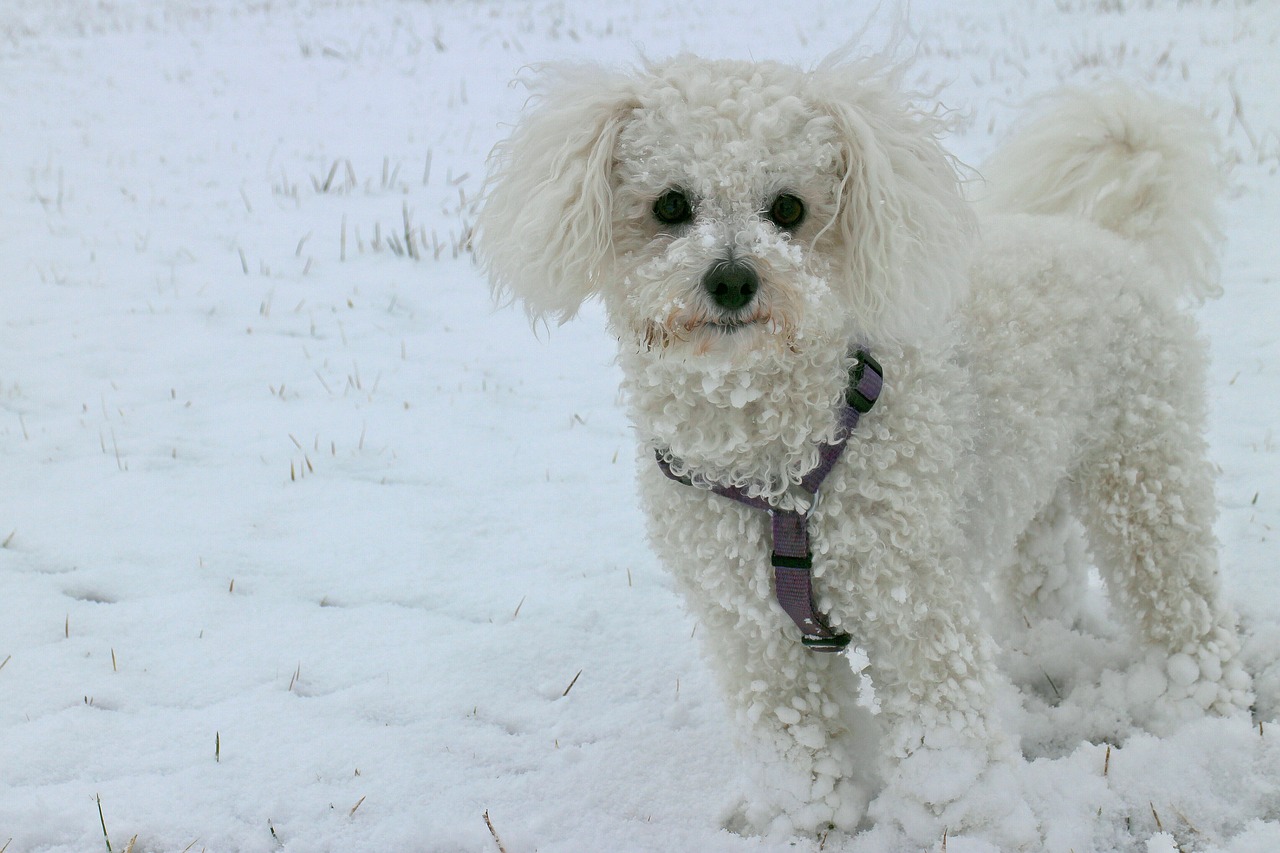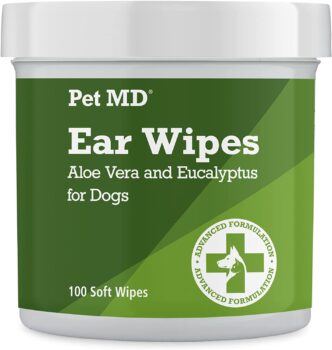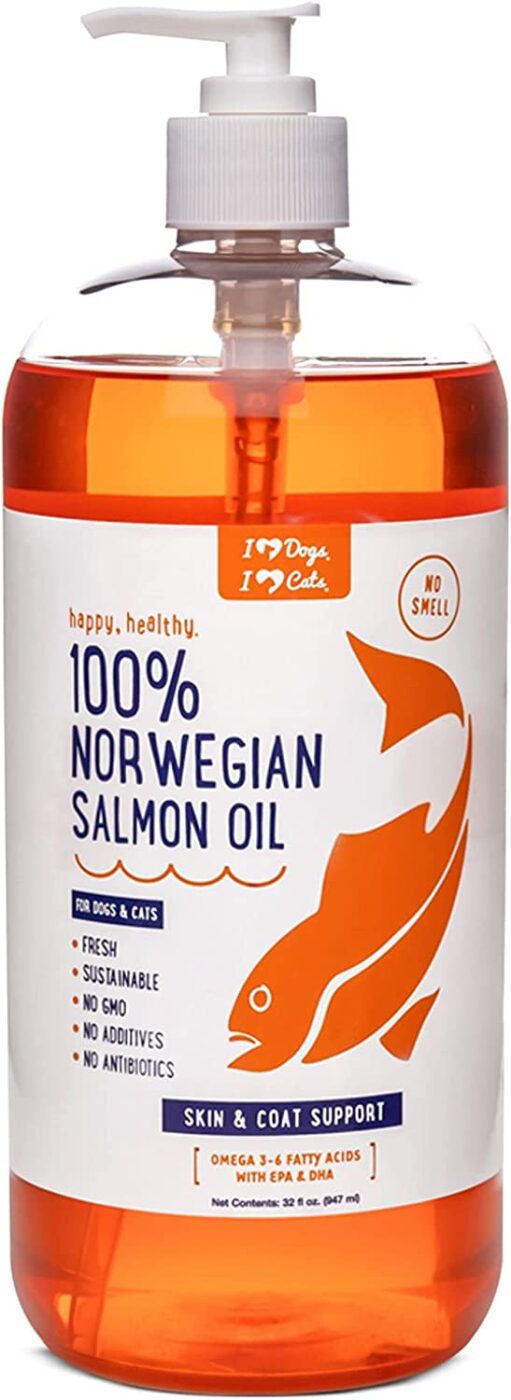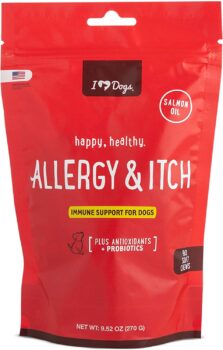Bichon Frises, with their fluffy white coats and jovial demeanor, make wonderful companions. However, these adorable dogs can be prone to ear infections. In this article, we’ll discuss 11 strategies for treating and preventing ear infections in Bichon Frises, highlighting the crucial role of Omega-3 fatty acids in their diet to combat allergies.
iHeartDogs is reader supported. Some of the links below may be paid affiliate links, where we receive a small commission on a product at no additional cost to you.
1. Regular Ear Cleaning
Regularly cleaning your Bichon Frise’s ears with a vet-approved solution helps remove accumulated wax and debris, thereby inhibiting the growth of bacteria and yeast.
Our favorite ear cleaner is these PetMD brand ear wipes on Amazon.
2. Thorough Drying of Ears
Always dry your Bichon Frise’s ears thoroughly after baths or swimming. The moist environment in the ear canal can facilitate the growth of bacteria and yeast, leading to infections.
3. Regular Vet Check-ups
Regular visits to the vet can help detect early signs of an ear infection, allowing for prompt treatment. Routine vet check-ups are also essential for maintaining your dog’s overall health.
4. Use Prescribed Medication Appropriately
If your Bichon Frise has an ear infection, your vet may prescribe antibiotics, antifungal, or anti-inflammatory medications. It’s crucial to complete the full course to prevent re-infection.
5. Dietary Modifications
Certain foods can trigger allergies in Bichon Frises, leading to inflammation and potential ear infections. Consult with your vet to see if dietary modifications could benefit your dog.
6. Incorporate Omega-3 Fatty Acids in Diet
Omega-3 fatty acids, renowned for their immune-boosting and anti-inflammatory properties, can be particularly beneficial for your Bichon Frise. The inclusion of Omega-3 in their diet, either through supplements or Omega-3-rich foods, can help fight allergies and reduce the risk of ear infections.
We’re fans of this Norwegian salmon oil on Amazon. It’s a bright orangish-pink color and has no fishy smell at all due to it’s ultra high purity.
7. Avoid Allergens
If your Bichon Frise has specific allergies, try to identify and avoid potential triggers. These could include certain types of food, pollen, dust mites, or molds.
A few good supplements to help your dog’s allergies are apple cider vinegar, quercetin, and colostrum, all of which are found in many natural allergy supplements like this one.
8. Immunotherapy
In cases of recurrent ear infections caused by allergies, your vet may recommend immunotherapy. This treatment gradually exposes your dog to small doses of the allergen, helping to build immunity over time.
9. Maintain a Healthy Weight
Keeping your Bichon Frise at a healthy weight reduces the risk of ear infections. Regular exercise and a balanced diet are key.
10. Use Dog-Specific Ear Care Products
Avoid using human ear care products, which could potentially harm your dog’s ears. Always opt for vet-approved, dog-specific products for ear cleaning and care.
11. Surgical Intervention
In severe or chronic cases, a surgical procedure may be necessary to improve ventilation in the ear canal. However, this option is usually considered as a last resort.
Frequently Asked Questions (FAQs)
- Why are Bichon Frises prone to ear infections? Their ear structure can facilitate wax build-up and their susceptibility to allergies can lead to inflammation and ear infections.
- What are the signs of an ear infection in my Bichon Frise? Symptoms may include redness, swelling, discharge, foul odor, and frequent shaking or scratching of the ears.
- How often should I clean my Bichon Frise’s ears? Generally, weekly cleaning is advisable. However, your vet may suggest a different frequency based on your dog’s health.
- Can diet impact my Bichon Frise’s ear health? Yes. Certain foods can trigger allergies, leading to inflammation and potential ear infections. Adding Omega-3 fatty acids to your Bichon Frise’s diet can help reduce inflammation and enhance their immune system.
- Are ear infections in Bichon Frises serious? If left untreated, ear infections can lead to chronic conditions and even hearing loss. Thus, early detection and treatment are crucial.
- Can I use human ear cleaning products for my Bichon Frise? No. Always use vet-approved, dog-specific products for ear cleaning to avoid causing harm.
- How can Omega-3 fatty acids benefit my Bichon Frise? Omega-3 fatty acids can bolster the immune system and reduce inflammation, which helps to prevent allergies and subsequent ear infections.
- What type of exercises are suitable for my Bichon Frise? Bichon Frises enjoy activities like walks, play fetch, and agility training. Regular exercise keeps them fit and helps maintain a healthy weight, reducing the risk of ear infections.
- Can ear infections in Bichon Frises be permanently cured? Although there’s no guaranteed permanent cure due to their propensity for allergies, regular ear care, diet adjustments, and other preventive measures can significantly lower the frequency and severity of ear infections.
- How can I tell if my Bichon Frise is allergic to something? Signs of allergies include excessive itching, redness, swelling, digestive issues, and recurrent ear infections. If you suspect an allergy, consult your vet for testing and appropriate treatment.
In conclusion, regular ear care, dietary adjustments like incorporating Omega-3 fatty acids, and routine vet check-ups are essential for preventing and treating ear infections in Bichon Frises. By following these guidelines, you can help ensure your Bichon Frise enjoys a healthy, vibrant life.




 Toledo, United States.
Toledo, United States.